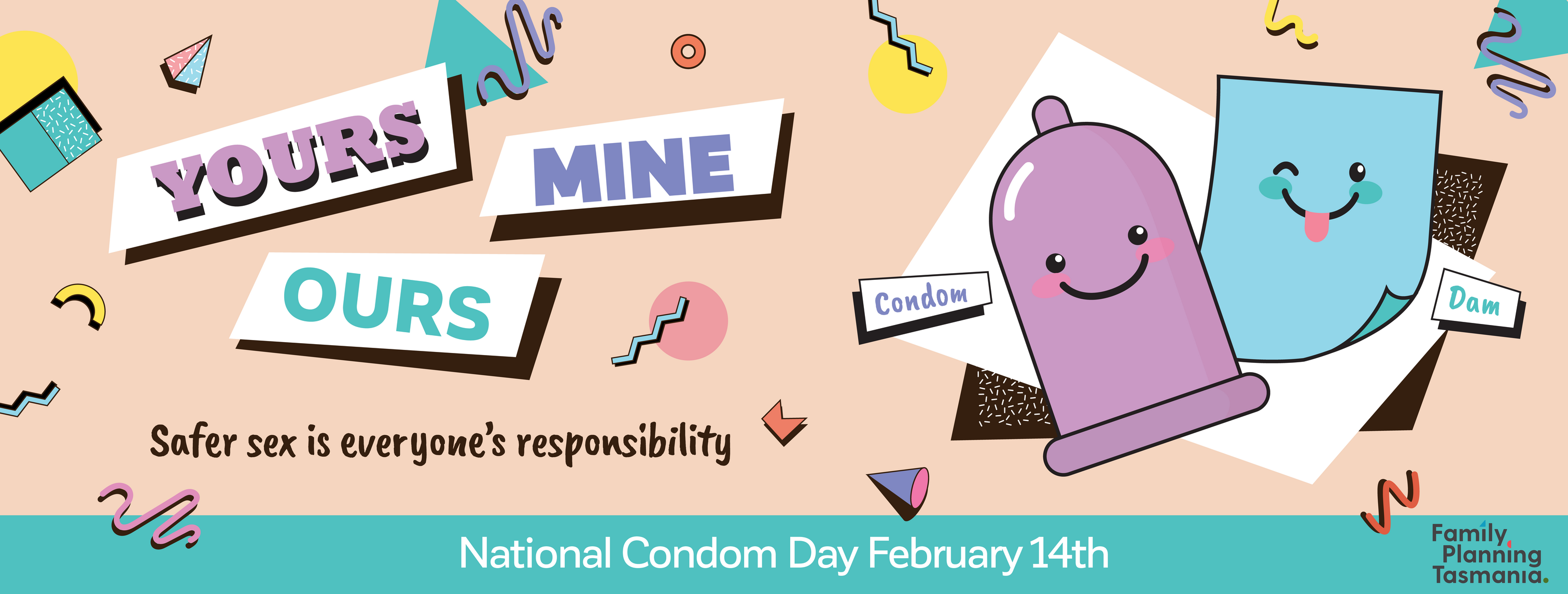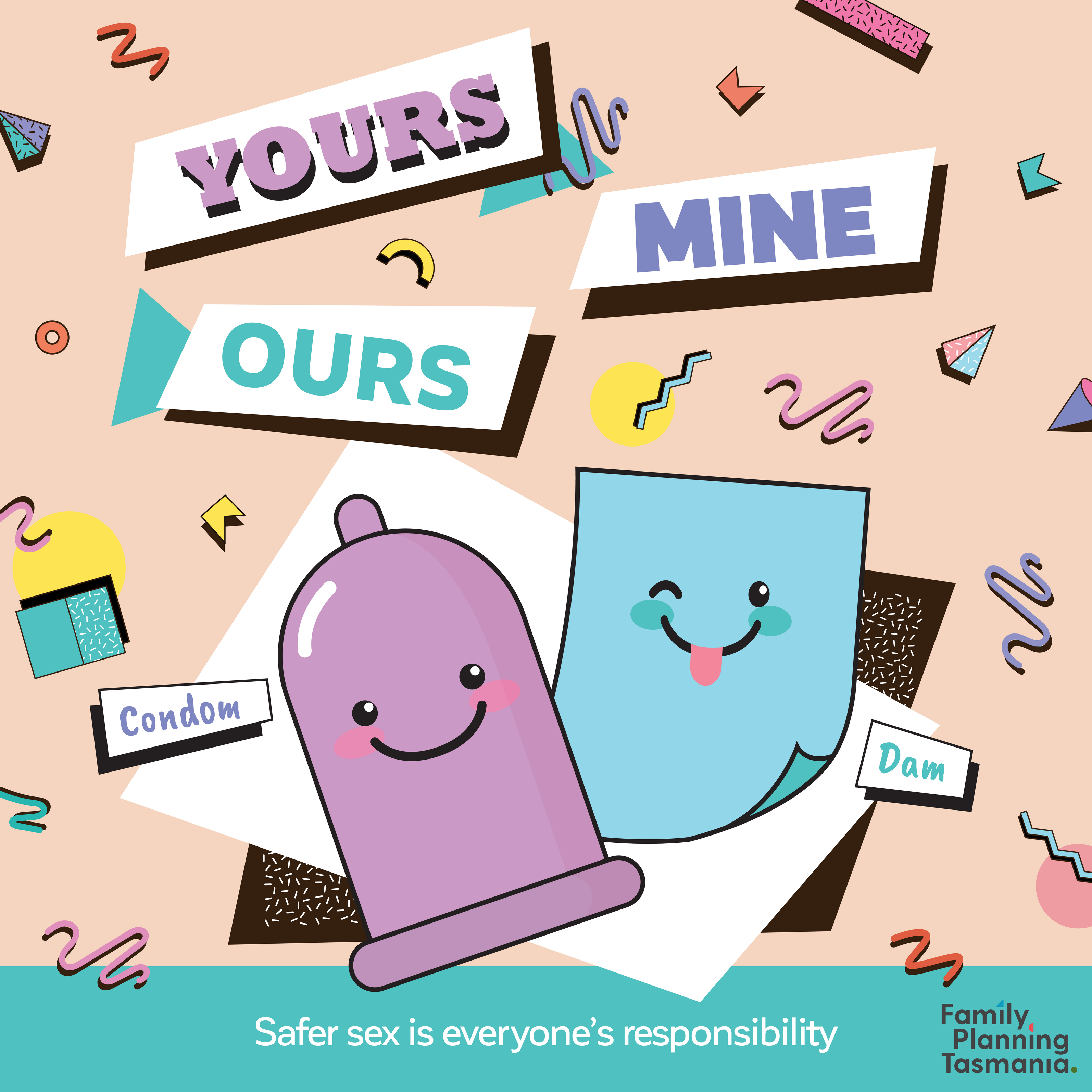
February 14 is National Condom Day, a national campaign to celebrate the almighty condom and remind everyone that it’s all our responsibility to be safe. This year’s theme is Yours, Mine and Ours, and features excellent graphics of condoms and dams.
Condoms are 98% effective at preventing pregnancy while being the only form of contraception that can prevent STI transmission. This year, Family Planning Tasmania has again partnered with the WA-based sexual and reproductive health organisation Sexual Health Quarters to produce approachable artwork that helps guide conversations on condom and dam use and safer sex practices.
This year’s theme is Yours, Mine and Ours.
The theme Yours, Mine and Ours refers to the fact that it’s everyone’s responsibility to practice safer sex. Most of us understand in theory how important using condoms is, but occasionally, it slips off the radar. Maybe we think it’s someone else’s responsibility to remember to bring a condom or that someone else can deal with the consequences of not using a condom. But it’s all our responsibility to practise safer sex, regardless of gender or sexual orientation. We all are responsible for taking care of ourselves and our sexual partners.
Being safer while having sex can be as simple as always carrying an accessible condom pack with you and getting regular Sexually Transmitted Infection (STI) screens. Like in previous years, we have developed a condom pack together with Sexual Health Quarters that displays accessible and fun artwork to help break down any perceived awkwardness of carrying a condom as well as help protect the condom. We have some available for order, use the form below to order some. We have also developed this poster with the artwork to make the conversation around safer sex practices seem a little less scary. Print out this poster to encourage conversations around condom use.
National Condom Day 2023 poster
Great news – condoms protect against pregnancy AND STIs!
Condoms work to protect against STI transmission because they form a physical barrier between body parts that touch, particularly genitals, hands and mouths, where STIs can be passed from person to person.
Barrier protection can make oral sex safer
Another lesser-known form of barrier protection are dental dams. Dental dams are rectangular pieces of latex and can be used on the vulva (the vaginal opening) or anus. Check out the video above to see how they work.
Dental dams are usually a bit more challenging to find and more expensive than male condoms, so if you don’t have one on you, you could turn a male condom into a dental dam, like in the video below.
Another option for barrier protection are latex underwear, which are often available at sex shops. Latex underwear may be preferable to dental dams as they stay in place rather than having to be held in place with your hands and cover the genitals and anus.
Being safer can mean regular STI screens
At Family Planning Tasmania, we advise that all sexually active people get regular STI screens at least every 12 months or after every incidence of unprotected sex, even if you are asymptomatic (no symptoms). But, of course, if you have symptoms, it’s always best to make an appointment with a doctor to get a screening. The good news is that it’s easy to book an appointment for an STI screen on our Family Planning Tasmania website by clicking here.
Often, the assumption is that only penetrative sex involving penises involves risk or that women who have sex with women are less likely to catch an STI than women who have sex with men (they are actually just as likely to contract an STI, although, the particular STIs can differ between groups (Australian STI Management Guidelines website).
The fact is that all kinds of sex can be risky. The person or people you’re having sex with might not tell you who they are also having sex with, as they might feel embarrassed or uncomfortable. In addition, they may not give you the full story on the safer sex practices they use with other partners.
To make it even more difficult, many STIs are asymptomatic. If your partners aren’t being regularly tested, they may not know that they have an STI and unwillingly transmit it to you. We advise getting regular STI screens because this will help you know that you don’t have any STIs or, if you do, help you get effective treatment early on. Treatment is straightforward and is most effective when the STI is diagnosed early.
In Australia, we are currently experiencing a big increase in cases of syphilis, including among women aged 15-44. Syphilis is a sexually transmitted infection that often has no symptoms but without treatment can cause serious health issues including brain infections, dementia, lung and heart failure, blindness and death. There is also a risk to babies born to women with syphilis.
National Condom Day 2023 is the perfect time to book your STI screen at your local Family Planning Tasmania clinic on our Book Appointment page here >> or ask your regular GP for an STI screen.


